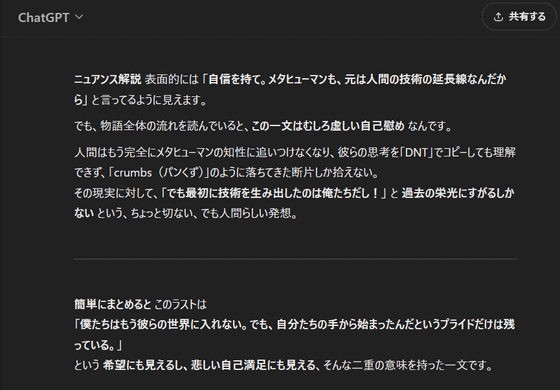'Picking up crumbs from the table' by science fiction writer Ted Chiang, who in 2000 predicted the future of AI and humanity

Science fiction is fictional, but it can also be a visionary insight into future technology and the environment, as in the case of
Catching crumbs from the table | Nature
https://www.nature.com/articles/35014679

'Catching Crumbs from the Table' is a short story by Ted Chiang, published in Nature on June 1, 2000. The story depicts a world in which advanced intelligences called 'metahumans' lead scientific research, and is the basis for a short story called 'The Evolution of Human Sciences' in the short story collection 'The Story of Your Life.'

'Picking Up Crumbs from the Table' and 'The Evolution of Human Science' are science fiction short stories set in fictional worlds, but they have no characters or dialogue and are written in a report-like format.
In the story, metahumans, who have intelligence far superior to that of humans, publish the results of their scientific research via a technology called Digital Neural Transfer (DNT). Since humans cannot understand the logic or language of metahumans, they secondarily understand the research results translated through DNT, which the metahumans improve, and use the results.
The rapid development of generative AI has led to growing voices that AI will take over human jobs and questions about AI's thinking capabilities. In fact, the importance of AI is increasing in the field of scientific research, with
Generative AI tools make it easy to fabricate images and experimental data, threatening scientific research - GIGAZINE

'Picking up Crumbs from the Table' predicted the current situation of AI in human society in 2000. The book states, 'No one denies the many benefits of metahuman science, but one of the costs for human researchers is that they have come to realize that they will probably never again make original contributions to science. Some have left the field entirely, while those who remain have shifted their focus from original research to hermeneutics, that is, interpreting the scientific work of metahumans.'
Professor Marcel Salathé, director of the AI Center at the Swiss Federal Institute of Technology in Lausanne, read a paper titled 'Tracing the Idea of Large-Scale Language Models (LLMs)' and commented, 'The change from engineering to science and trying to understand exactly how its creations work is more profound than many realize. Engineering has traditionally applied our understanding of the physical world, mathematics, and logic to build predictable things. But now, especially in fields like AI, we are building systems that are so complex that we can no longer fully understand them. We now need to use scientific methods originally designed to understand nature to understand the creations we engineer ourselves. This is amazing.' In response to Professor Salathé's comments, the social site Hacker News pointed out that 'what Ted Chan predicted in 2000 is happening.'
Although the novel depicts a world in which human scientific research has become meaningless, it does not portray this world as a bad one, writing, 'Human culture may continue to exist in the future, and the scientific tradition is an important part of that culture. Hermeneutics is a legitimate method of scientific inquiry and, like original research, increases human knowledge.'
The work concludes with the sentence, 'There is no need to be afraid of the achievements of metahuman science. The technology that made metahumans possible was originally invented by humans, and the humans who invented it were no smarter than us.' At first glance, this seems like a hopeful statement, but when I asked ChatGPT about his interpretation of this sentence, he replied that 'Humans can no longer keep up with the intelligence of metahumans, and even if we copy their thoughts with 'DNT', we cannot understand them, and we can only pick up the fragments that fall like 'crumbs'. In response to this reality, we can only cling to our past glory and say, 'But we were the ones who created the technology in the first place!'' It seems like hope, with only pride remaining, but also sad self-satisfaction.

Related Posts:
in Software, Posted by log1e_dh







